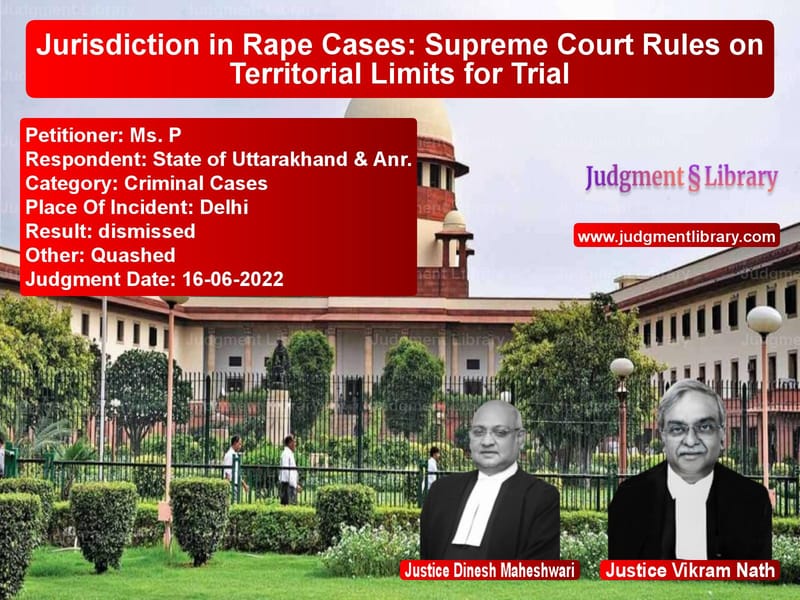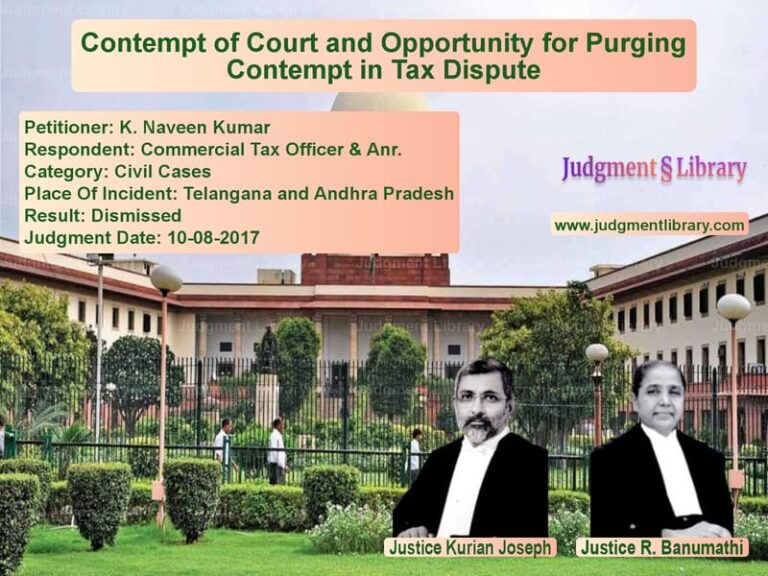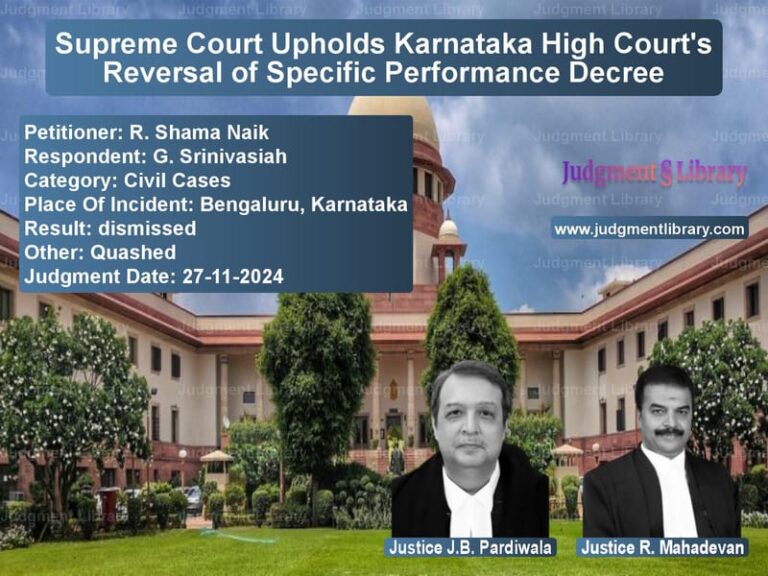Jurisdiction in Rape Cases: Supreme Court Rules on Territorial Limits for Trial
The Supreme Court recently addressed an important issue regarding the territorial jurisdiction of courts in rape cases in the case of Ms. P v. State of Uttarakhand & Anr.. The dispute revolved around whether a Sessions Court in Chamoli, Uttarakhand, had the jurisdiction to try a rape case that allegedly took place in Delhi. The Supreme Court upheld the Sessions Court’s decision to discharge the accused under Section 376 IPC due to lack of jurisdiction, emphasizing the significance of territorial limits in criminal trials.
The ruling clarifies the applicability of Sections 178, 179, and 220 of the Code of Criminal Procedure (CrPC) in cases where offences are committed in multiple locations. It also underscores that different offences in the same case must be tried together only if they form part of a single transaction.
Background of the Case
The case involved a complaint filed by Ms. P, alleging that the accused, Narendra Shah, had raped her in Delhi after they got engaged in Uttarakhand. According to the complainant, she was invited to Delhi by the accused under the pretext of marriage, where she was subjected to sexual intercourse against her will. She further alleged that after she refused to give him ₹25 lakh for a house in Delhi, he refused to marry her and threatened her.
The case progressed as follows:
- January 21, 2017: A complaint was filed under Section 156(3) CrPC before the Judicial Magistrate, Chamoli, seeking registration of an FIR.
- FIR No. 3 of 2017 was registered at Police Station, Gairsain, under Sections 376, 504, and 506 IPC.
- October 28, 2017: The Sessions Court at Chamoli discharged the accused for rape charges, citing lack of jurisdiction.
- September 25, 2018: The Uttarakhand High Court dismissed the revision petition against the discharge order.
- June 16, 2022: The Supreme Court upheld the Sessions Court’s decision.
Petitioner’s Arguments
The complainant, Ms. P, argued that:
- The offences under Sections 376, 504, and 506 IPC formed part of the same transaction and should be tried together under Section 220 CrPC.
- The accused used threats and coercion to engage in sexual intercourse, making it an offence that should be tried where the victim resided.
- The threats issued by the accused over the phone created a continuing offence under Section 179 CrPC, which allows the offence to be tried in any jurisdiction where its consequences ensued.
- The High Court’s assumption that the case involved an acquittal rather than a discharge was erroneous.
Respondent’s Arguments
The accused, Narendra Shah, and the State of Uttarakhand argued that:
- The alleged rape took place in Delhi, making it outside the territorial jurisdiction of the courts in Uttarakhand.
- The threat allegations did not form part of the same transaction as the alleged sexual offence and were separate incidents.
- The complainant had consensual intercourse with the accused on a later occasion, undermining her allegations.
- The High Court correctly ruled that the Sessions Court lacked jurisdiction.
Key Observations of the Supreme Court
The Supreme Court ruled that the Sessions Court at Chamoli lacked territorial jurisdiction to try the accused for rape. The Court made the following observations:
“The expression ‘same transaction’ is incapable of exact definition. It must be decided based on proximity of time, place, continuity of action, and commonality of purpose.”
The Court emphasized:
- The alleged sexual offence occurred entirely in Delhi, meaning that a court in Uttarakhand could not try the rape charge.
- The threats made over the phone at a later stage were a separate offence and did not form part of the same transaction as the alleged rape.
- The offence of rape is not a continuing offence and cannot be tried in a jurisdiction where its consequences are felt.
- There was no procedural illegality in the Sessions Court’s decision to discharge the accused for rape due to lack of jurisdiction.
Final Judgment and Directions
The Supreme Court issued the following directives:
- The appeal was dismissed.
- The discharge of the accused for rape charges was upheld.
- The case concerning Sections 504 and 506 IPC was tried separately by the Judicial Magistrate, Chamoli, and the accused was acquitted.
- The judgment of acquittal for Sections 504 and 506 IPC was considered final and binding.
Conclusion
This ruling reaffirms the principle that territorial jurisdiction in criminal cases must be strictly followed. The Supreme Court clarified that different offences cannot be artificially connected to create jurisdiction in a court where the primary offence did not occur.
By upholding the Sessions Court’s decision, the judgment ensures that courts operate within their territorial limits while still protecting the rights of victims and accused persons under Indian law.
Petitioner Name: Ms. P.Respondent Name: State of Uttarakhand & Anr..Judgment By: Justice Dinesh Maheshwari, Justice Vikram Nath.Place Of Incident: Delhi.Judgment Date: 16-06-2022.
Don’t miss out on the full details! Download the complete judgment in PDF format below and gain valuable insights instantly!
Download Judgment: ms.-p-vs-state-of-uttarakhand-supreme-court-of-india-judgment-dated-16-06-2022.pdf
Directly Download Judgment: Directly download this Judgment
See all petitions in Rape Cases
See all petitions in Judgment by Dinesh Maheshwari
See all petitions in Judgment by Vikram Nath
See all petitions in dismissed
See all petitions in Quashed
See all petitions in supreme court of India judgments June 2022
See all petitions in 2022 judgments
See all posts in Criminal Cases Category
See all allowed petitions in Criminal Cases Category
See all Dismissed petitions in Criminal Cases Category
See all partially allowed petitions in Criminal Cases Category







